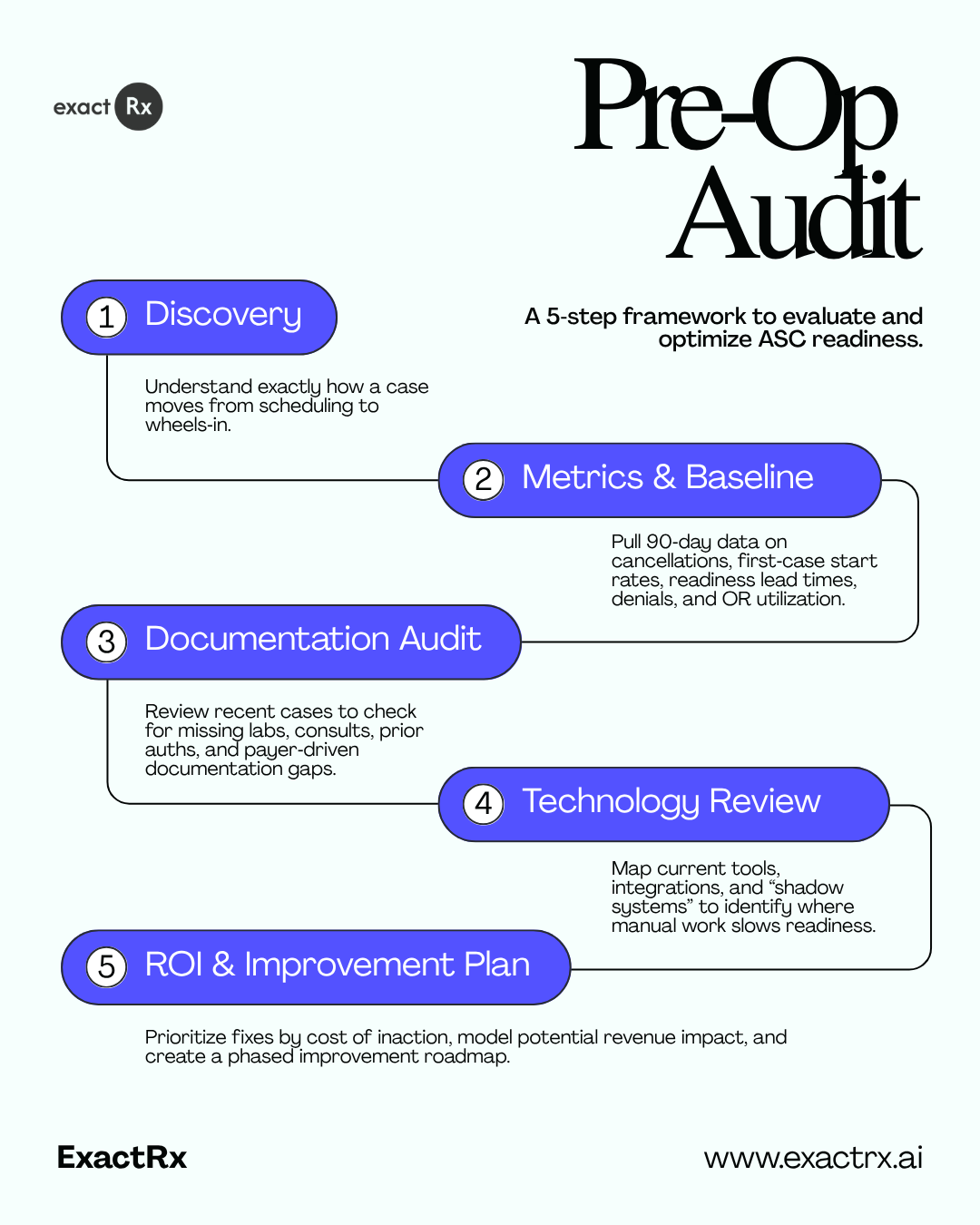Horizon Blue Cross Blue Shield of New Jersey agreed to a $100M settlement over alleged failures to follow the state’s “lesser of” payment rule.

When pre‑op steps happen across different teams and systems, small misses can snowball into costly delays to care.
Almost 60% of surgery cancellations are avoidable, and about 25% happen on the day of surgery itself (Yildiz et al., 2024; Askari et al., 2022; Haana et al., 2013). Each delay to care is more than a scheduling headache. For ambulatory surgery centers, it’s lost revenue, unexpected write-offs, and increased case rollover, overtime, and patient rescheduling burdens. For ASCs, these avoidable delays not only mean lost revenue but also lower block time utilization, more rollover cases, and increased overtime costs.
A lot of pre-op work happens before the case ever arrives at the ASC, and it mostly takes place in your surgeon partners’ offices. Their teams are handling tasks like benefit checks, prior authorizations, lab orders, outside consults, and collecting paperwork—all often on tight timelines and with different office processes. Because these details are managed outside the ASC, missing labs, unsigned consents, or incomplete clearances sometimes aren’t discovered until the patient arrives. The result is that delays or denials can trace back to these early steps, well before your team is directly involved.
When pre-op details slip through the cracks, the impact can be felt all the way through the surgical schedule. If something like a missing consent or late lab result isn’t caught early, the surgery might get canceled at the last minute. As mentioned earlier, almost a quarter of cancellations happen on the day of surgery, which creates real challenges for the whole team.
A canceled case doesn’t just mean an empty slot on the schedule. It means the center loses money that was expected to pay for staff, supplies, and future improvements. Sometimes, the insurance claim is denied, so the center has to bill the patient at a much lower rate or write off the case entirely. When this keeps happening, it limits the center’s ability to grow and improve, and it makes life harder for both staff and patients with extra rescheduling and paperwork.
This is why catching pre-op gaps early matters. Understanding how these last-minute cancellations affect the entire center helps show why it’s so important to invest in a better process. Up next, we’ll look at some practical ways to make sure fewer issues slip by and more surgeries stay on track.

Here’s how one ambulatory surgery center tackled the exact pre-op gaps discussed earlier - missing prior authorizations, incomplete labs, and unsigned consents - by adopting an integrated, cloud-based workflow platform (Athenahealth, 2025). Before these changes, important steps like authorizations and documentation were often delayed because teams relied on manual processes and separate systems.
By centralizing these workflows, the center could see, in real time, which pre-op requirements were outstanding for each case. Automated reminders flagged issues like missing consents or incomplete diagnostic results before they became day-of-surgery problems. The dashboards also made it easier for staff to assign resources more effectively and reduce case rollover. As a result, the center saw faster scheduling, more clean claims submitted on the first try, and a noticeable drop in last-minute cancellations and denied claims.
Centers recognized by Newsweek or US News for top performance share several practices:
If cancellations and write-offs keep happening, reviewing your pre-op process is a smart first step. Identify frequent gaps and who tends to catch them. Learn from others by reading case studies or best-practice guides from top centers, and see what changes could work for your own ASC.
If you’re ready to see how optimized pre-op readiness can improve outcomes and revenue for your ambulatory surgery center, the next step is simple: schedule a quick call with our team to discuss proven strategies and technology solutions tailored to your needs. Ready to take action? Reach out today to set up your consultation.
References (APA):
American Urological Association. (2020). Pre-operative care for the patient undergoing urologic surgery or procedure. Retrieved from https://www.auanet.org/guidelines-and-quality/quality-and-measurement/quality-improvement/clinical-consensus-statement-and-quality-improvement-issue-brief-(ccs-and-qiib)/optimizing-outcomes-in-urological-surgery-pre-operative-care-for-the-patient-undergoing-urologic-surgery-or-procedure
Askari, A., Nunn, R., Hajuthman, W., Shehzad, K., & Riaz, A. (2022). Reasons for Same-day Cancellation in a Dedicated Day Surgery Hospital. Ambulatory Surgery, 26(2), 1-5. https://ambulatorysurgery.org/wp-content/uploads/2022/06/26.2_ASKARI-1.pdf
Athenahealth. (2025). Strategic guide for ambulatory surgery centers. Retrieved from https://www.athenahealth.com/resources/blog/strategic-playbook-for-ambulatory-surgery-center-growth
Expedium. (2025). 10 proven strategies to improve workflow efficiency in ambulatory surgery centers. Retrieved from https://www.expedium.net/blog/10-proven-strategies-to-improve-workflow-efficiency-in-ambulatory-surgery-centers/
Haana, V., Sethuraman, K., Stephens, L., & Raphael, J. (2013). Dynamics of Elective Case Cancellation for Inpatient and Outpatient Surgery: A Prospective Study. Canadian Journal of Surgery, 56(3), E89–E94. https://pmc.ncbi.nlm.nih.gov/articles/PMC3839960/
Newsweek. (2023). America’s Best Ambulatory Surgery Centers 2023. https://www.newsweek.com/rankings/americas-best-ambulatory-surgery-centers-2023
Yildiz, T., Ozkara, E., & Yildiz, A. (2024). Prevalence and Causes of Elective Surgery Cancellations After Operating Room Admission. Journal of Surgery and Medicine, 8(2), e10901048. https://pmc.ncbi.nlm.nih.gov/articles/PMC10901048/
Subscribe for the latest insights on surgical workflows, anesthesia best practices, and healthcare innovation.

Dive into our latest posts on surgical workflows, anesthesia care, and healthcare trends. Discover tips, trends, and expert perspectives to stay ahead in the OR.